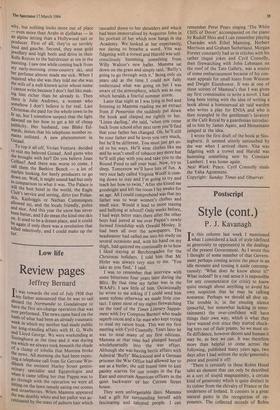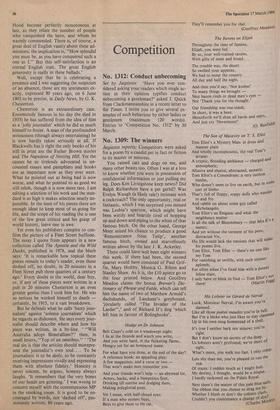Postscript
Style (cont.)
P. J. Kavanagh
Tn this column last week I mentioned 1 what I considered a lack of style (defined as generosity to opponents) in the dealings of the present Government. As I wrote this I thought of some member of that Govern- ment perhaps coming across the piece in an idle moment and tossing it aside contemp- tuously: 'What does he know about it!' What indeed? In a real sense it is impossible for any commentator (or critic) to know quite enough about anything to avoid his own suspicion that he may be talking nonsense. Perhaps we should all shut up. The trouble is, in the ensuing silence (peaceful, but somewhat lacking in enter- tainment) the over-confident will have things their own way, which is what they have wanted ever since they started chuck- ing toys out of their prams. So we must sti- fle diffidence, however decent and human it may be, as best we can. It was therefore more than helpful to come across the following, published many years ago, two days after I had written the style/generosity piece and posted it off:
`There is certainly in these Robin Hood tales an element that can only be described as a sort of stupid magnanimity, a certain kind of generosity which is quite distinct in its colour from the chivalry of France or the tenderness of Ireland. It consists in a great natural gusto in the recognition of op- ponents. The collected records of Robin
Hood become perfectly monotonous at last, as they relate the number of people who vanquished the hero, and whom he warmly commended. There is, of course, a great deal of English vanity about these ad- missions; the implication is, "How splendid you must be, as you have conquered such a one as I." But this self-satisfaction is an eternal English trait. The great English generosity is really in these ballads.'
Well, except that he is celebrating a presence and I was suggesting the suspicion of an absence, those are my sentiments ex- actly, expressed 80 years ago, on 6 June 1903 to be precise, in Daily News, by G. K. Chesterton.
Chesterton is an extraordinary case. Enormously famous in his day (he died in 1935) he has suffered from the idea of him as a 'jolly journalist' which he did so much himself to foster. A man of the profoundest seriousness (though always entertaining) he is now hardly taken seriously at all. If Blackwells has it right the only books of his still in print are the Father Brown stories and The Napoleon of Notting Hill. Yet the causes he so tirelessly advocated in un- counted essays and pamphlets and books are as important now as they ever were. What he pointed out as being bad is now worse, and what he pointed to as good we still relish, though it is now more rare. I am editing a selection of his work and the stan- dard is so high it makes selection nearly im- possible. In the least of his pieces there are enough ideas to keep most of us going for life, and the scope of his reading (he is one of the few great critics) and his grasp of world history, leave one in awe.
Yet even his publishers conspire to con- firm the picture of a Fleet Street buffoon. The essay I quote from appears in a new collection called The Apostle and the Wild Ducks, published in 1978, and the blurb says: 'It is remarkable how topical these pieces remain to today's reader, even those dashed off, no doubt, in 20 minutes in a Fleet Street pub three quarters of a century ago.' Every doubt in the world, dear boy, or, if any of these pieces were written in a pub in 20 minutes Chesterton is an even greater genius than I took him for. He was so serious he worked himself to death certainly, by 1915, to a vast breakdown.
But he defends what he calls 'hasty jour- nalism' against 'solemn journalism' which he regards as dishonest. He says every jour- nalist should describe where and how his
piece was written, in a by-line. "Will Australia adopt Bimetallism?" then, in small letters, "Top of an omnibus." "The real sin is that the articles should misrepre- sent the journalist's own soul.... To be journalistic is to be daily, to be constantly receiving impressions vividly and expressing them with absolute fidelity.' Honesty is never solemn, he argues, honesty always laughs. 'It remembers that the very bones of our heads are grinning.' I was wrong to concern myself with the contemptuous MP in the smoking room. It is good to be en- couraged by words, not 'dashed off , pas- sionately written, 80 years ago.















































 Previous page
Previous page